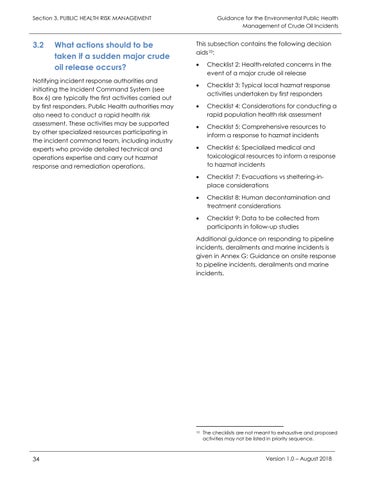Section 3. PUBLIC HEALTH RISK MANAGEMENT
3.2
What actions should to be taken if a sudden major crude oil release occurs?
Notifying incident response authorities and initiating the Incident Command System (see Box 6) are typically the first activities carried out by first responders. Public Health authorities may also need to conduct a rapid health risk assessment. These activities may be supported by other specialized resources participating in the incident command team, including industry experts who provide detailed technical and operations expertise and carry out hazmat response and remediation operations.
Guidance for the Environmental Public Health Management of Crude Oil Incidents
This subsection contains the following decision aids 10: •
Checklist 2: Health-related concerns in the event of a major crude oil release
•
Checklist 3: Typical local hazmat response activities undertaken by first responders
•
Checklist 4: Considerations for conducting a rapid population health risk assessment
•
Checklist 5: Comprehensive resources to inform a response to hazmat incidents
•
Checklist 6: Specialized medical and toxicological resources to inform a response to hazmat incidents
•
Checklist 7: Evacuations vs sheltering-inplace considerations
•
Checklist 8: Human decontamination and treatment considerations
•
Checklist 9: Data to be collected from participants in follow-up studies
Additional guidance on responding to pipeline incidents, derailments and marine incidents is given in Annex G: Guidance on onsite response to pipeline incidents, derailments and marine incidents.
10
34
The checklists are not meant to exhaustive and proposed activities may not be listed in priority sequence.
Version 1.0 – August 2018







